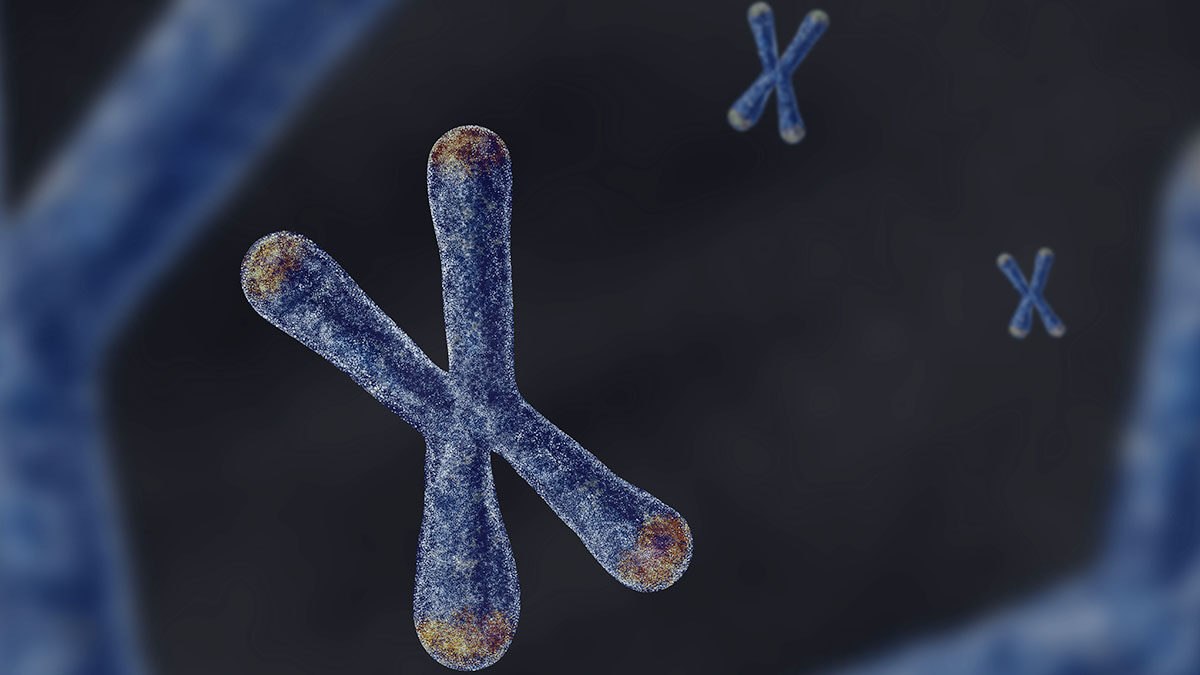In my video, Does Meditation Affect Cellular Aging?, I discussed how stress reduction through meditation might be able to lengthen telomeres, the protective caps at the tips of our chromosomes that tend to deplete as we age.
What about exercise? We can’t always change our situation in life, but we can always go out for a walk. London researchers studied 2,400 twins, and those who exercised more may have pumped up their telomeres along with their muscles. Apparently it doesn’t take much either. The “heavy” exercise group was only averaging about a half-hour a day.
These were mostly folks in their 40’s, but does it still work in your 50’s? Yes. A study out of South Korea found that people in their 50’s who work out three hours a week had longer telomeres.
In my video, Telomeres: Cap It All Off with Diet, you can see the telomere lengths of young healthy regular folk controls at around age 20, and then at age 50. As we’d expect, the older subjects’ telomeres were significantly shorter. What about athletes? The young athletes started out in the same boat, with nice, long, young, healthy telomeres capping all their chromosomes. The older athletes, in contrast to the controls, appeared to still have the chromosomes of 20-year-olds. But these were marathon runners, triathletes running 50 miles a week for 35 years.
What was it about the Ornish intervention that so powerfully protected telomeres after just three months? We saw that stress management seems to help, but what about diet and exercise? Was it the plant-based diet, was it the walking 30 minutes a day, or was it just because of the weight loss? In 2013, a study was published that can help us answer just that question.
The researchers took about 400 women and randomized them into four groups: a portion-controlled diet group, an exercise group, a portion controlled diet and exercise group, and a control group for a full year. In the video, you can see a comparison of the length of each group’s telomeres. After a year of doing nothing, there was essentially no change in the control group, which is what we’d expect. The exercise group was 45 minutes of moderate-to-vigorous exercise like jogging. After a year of that, they did no better. What about just weight loss? Nothing. The same thing for exercise and weight loss, no significant change either.
So, as long as we’re eating the same diet, it doesn’t appear to matter how small our portions are, or how much weight we lose, or how hard we exercise. After a year, the subjects saw no benefit. On the other hand, the Ornish group on the plant-based diet, who lost the same amount of weight after just three months and exercised less than half as hard, saw significant telomere protection.
It wasn’t the weight loss or the exercise: it was the food.
What aspects of a plant-based diet make it so protective? Studies have associated more vegetables and fruit, and less butter, with longer telomeres. From the latest review, foods high in fiber and vitamins are strongly related to longer telomeres. However, the key may be avoiding saturated fat. Swapping just 1% of saturated fat calories in our diet for anything else can add nearly a whole year of aging’s worth of length onto our telomeres.
Saturated fats like palmitic acid, the primary saturated fat in salmon, and found in meat, eggs, and dairy in general, can be toxic to cells. This has been demonstrated in heart cells, bone marrow cells, pancreatic cells, and brain cells. The toxic effects on cell death rates happen right around what you’d see in the blood stream of people who eat a lot of animal products. It may not be the saturated fat itself, however, as saturated fat may just be a marker for the increased oxidative stress and inflammation associated with those foods.
With this link to saturated fat, it’s no wonder that lifelong low cholesterol levels have been related to longer telomeres and a smaller proportion of short telomeres—in other words, markers of slower biological aging. In fact, there’s a rare congenital birth defect called progeria syndrome, where children age 8-10 times faster than normal. It seems associated with a particular inability to handle animal fats.
The good news is that “despite past accumulated injury leading to shorter telomere lengths, current healthy behaviors might help to decrease a person’s risk of some of the potential consequences like heart disease.” Eating more fruit and vegetables and less meat and having more support from friends and family attenuate the association between shorter telomeres and the ravages of aging.
To summarize: inflammation, oxidation, damage and dysfunction are constantly hacking away at our telomeres. At the same time, our antioxidant defenses, healthy diet, exercise and stress reduction are constantly rebuilding them.
I’ve asked this diet versus exercise question in a few other contexts. See:
- Arteries of Vegans vs. Runners
- Is It the Diet, the Exercise, or Both?
- How Much Exercise to Sustain Weight Loss?
Though dietary change appears more impactful, I’m a big fan of walking. See Longer Life Within Walking Distance and for my personal favorite exercise, Standing Up for Your Health.
For more on the role saturated fat may play in disease, see, for example, my videos Heart Disease Starts in Childhood and Treating Multiple Sclerosis with the Swank MS Diet.
In health,
Michael Greger, M.D.
PS: If you haven’t yet, you can subscribe to my free videos here and watch my live year-in-review presentations Uprooting the Leading Causes of Death, More Than an Apple a Day, From Table to Able, and Food as Medicine.
